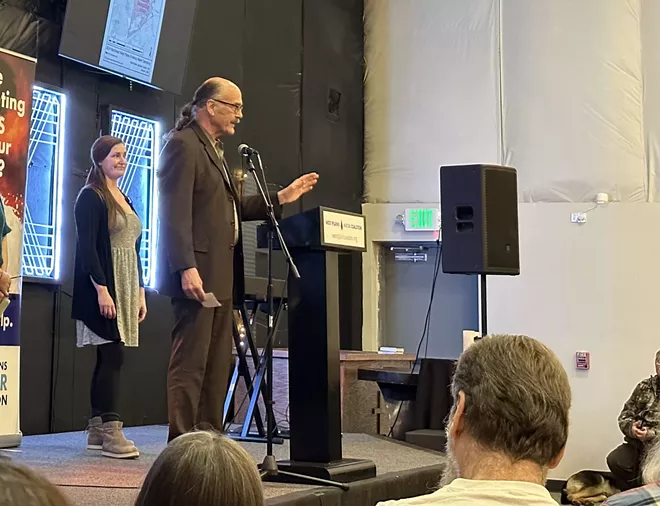
This week, people concerned about pollution on the West Plains will get yet another chance to learn about ongoing cleanup efforts at Fairchild Air Force Base and in the surrounding area.
The base's Restoration Advisory Board meeting will take place from 3 pm to 4:30 pm on Wednesday, Feb. 7, at the Shriners Event Center, Bay 3, 7217 W. Westbow Blvd. in Spokane.
There will be an open house afterward from 6 pm to 8 pm led by the West Plains Water Coalition, which is hosting a series of educational opportunities on PFAS (per- and polyfluoroalkyl substances) contamination in the groundwater there. The coalition recently released a short documentary about the issue.
The Restoration Advisory Board discusses various contaminants on the base that need to be cleaned up and serves as a public forum for people to weigh in on environmental restoration work. After the military tested wells in the area in 2017 and found that PFAS contamination from the base's use of firefighting foam had polluted nearby water, that family of chemicals was added to the board's priorities.
The almost 15,000 chemicals in the manmade PFAS family are often referred to as "forever chemicals" due to their strong chemical bonds, which make them difficult to break down. The chemicals bioaccumulate in the body and are linked with high cholesterol, kidney and testicular cancer, reproductive health issues, and liver and immune system issues.
Last week, dozens of concerned citizens attended a West Plains Water Coalition meeting in Airway Heights to hear from Eastern Washington University geology professor Chad Pritchard, who is leading a study this year to better understand how that pollution flows through groundwater on the West Plains.
As Pritchard told the crowd, we already know that groundwater tends to flow northeast through the West Plains.
PFAS are found in many consumer applications, from stain resistant furniture to nonstick cookware. Some of the chemicals are also found in high concentrations in a foam for fighting fuel fires that was used — and until recently, federally mandated to have on hand — at Fairchild Air Force Base and Spokane International Airport.
Since 2017, private well testing done by the military has almost entirely focused on the area west of Hayford Road, so less is known about the wells east of that and north of the airport.
Pritchard's study, funded by the state Department of Ecology, will focus east of Hayford, north of Interstate 90 and up to the Spokane River, which should provide more insight for residents of areas the military hasn’t tested.
As part of the study, he will create a three-dimensional map of the underground aquifers and paleochannels on the West Plains, including data from well tests to show where some PFAS contamination has been found. That will help illuminate where the contamination is moving from the upper aquifer into the lower aquifer.
In addition to existing data that residents have shared from their well tests, the goal is to test roughly 30 locations multiple times this year to see if there is any seasonal variation in how the contamination flows.
There are nearly 1,500 private wells in the area, and over the last several years, many residents have learned that their water is unsafe to drink due to PFAS levels that exceed health standards.
However, West Plains Water Coalition founder John Hancock gave the audience last week some reassuring information: About half of the well tests that have been shared with the coalition showed "no detect" for the concerning chemicals.
And, for those who still don't know one way or the other, there's also good news: Testing will soon be available.

MORE TESTING EAST OF HAYFORD
The aquifers on the West Plains do not connect with the Spokane Valley-Rathdrum Prairie Aquifer, which stretches from North Idaho to the west end of Spokane and provides the drinking water for much of the Spokane-Coeur d'Alene region. Since the contamination was found in Airway Heights in 2017, Spokane has provided water from the SVRP aquifer to Airway's municipal water system by contract.
However, many homeowners in the area use private wells and still want to have their water tested.
Within a few weeks, West Plains residents east of Hayford Road will be able to sign up to have someone from the Environmental Protection Agency do just that.
At the Monday, Jan. 29, meeting, representatives from the EPA and Ecology explained that the state environmental agency recently asked the EPA to help test wells in the area.
Residents who are interested in having the EPA test their wells for free can keep an eye on the Ecology webpage for the issue here.
Importantly, because the EPA protects data differently than the state, residents who participate will be asked if they're willing to share their test results with Pritchard and Ecology so they can include that information in the study and better understand how to get started on cleanup solutions. The information shared with Ecology would become public record, but residents can redact some details if that makes them more comfortable, staff explained. Otherwise, the results will remain private.
Those who participate will receive information on how to share their results.
OTHER PFAS NEWS
Last week also saw two interesting announcements at the federal level.
On Thursday, Feb. 1, the Biden administration announced that the EPA will work on two new rules to address PFAS contamination.
The first would modify the definition of hazardous waste to make it clear that the EPA and states have the authority to require the cleanup of emerging chemicals of concern, including PFAS, at permitted hazardous waste facilities.
The second would add multiple PFAS compounds to a list of hazardous constituents that need to be considered when assessing facilities and, if needed, can be investigated and cleaned up during a corrective action process at hazardous waste treatment, storage and disposal facilities.
Both rules are intended to prevent water contamination near the 1,740 hazardous waste facilities that are permitted around the country. The proposed rules will be posted in the federal register within a few weeks, and will be open for public comment for 30 to 60 days.
More interesting PFAS news came that same day, with the introduction of the PFAS Accountability Act in Congress.
Introduced by U.S. Sen. Kirsten Gillibrand, D-NY, and U.S. Rep. Madeleine Dean, D-Pa., the act would allow courts to award medical monitoring costs (paid for by PFAS manufacturers) to victims who've been exposed to PFAS.
Currently, only 14 states allow people to seek ongoing "no-injury" medical monitoring costs. While they aren't necessarily sick yet, people may want to keep an eye out for health issues related to the chemicals that can take years to appear.
Washington is one of the states that doesn't allow "no-injury" medical monitoring costs to be awarded, and it's unclear what the official status is in Idaho, according to a Drug and Device Law blog that analyzed the policy in all 50 states.
“PFAS are dangerous, carcinogenic substances, and the companies that knowingly manufactured them for years must be held accountable,” Sen. Gillibrand said in a news release. “My PFAS Accountability Act would help ensure that people who were or are being exposed to high levels of PFAS have legal recourse. And because PFAS-related illnesses can take years to develop, this bill also makes sure that victims can receive long-term medical monitoring as part of their remedies. I’m determined to get it passed.”
If passed, the act would ensure that people in all states can seek that ongoing cost.


























